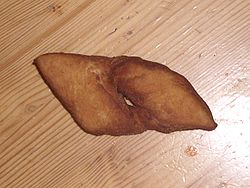Kleina
 |
|
| Alternative names | Klena, Klejne, Kleina, Kleyna, Fattigmann |
|---|---|
| Type | Doughnut |
| Region or state | Northern Europe |
| Main ingredients | flour, egg yolks, sugar, margarine or butter |
| |
|
Klenät, klena, klejne, kleina, kleyna, and fattigmann are all names for a fried pastry common in the Nordic countries. It is also found in nearby countries (such as Lithuania, under the name Žagarėliai). The name is related to klen, the Swedish term for "slender", but is originally of Low German origin, which may indicate that the pastry was originally German. It is made from flattened dough cut into small trapezoids. A slit is cut in the middle and then one end pulled through the slit to form a "knot". The kleina is then deep-fried in oil or another kind of fat.
In mainland Scandinavia, klenäter are traditionally eaten around Christmas, most commonly in the southern parts of Sweden, but also in Iceland, Norway and Denmark, the Baltic states, as well as Northern Germany. They may be sprinkled with sugar. Icelandic Kleinur are a very common everyday pastry, sold in bakeries (singly) and stores (in bags of ten or so) all around the country, and eaten plain.
The pastries are used as part of a Christmas game in Scandinavian culture. They are tied to a string and hung in an open doorway. The game requires two people to play, but a crowd must be present to enjoy. One participant must attempt to bite the kleina off the string, using only his or her mouth (no hands!), while the other participant manipulates the unadorned end of the string.
Klenäter are an old type of pastry and are mentioned in Icelandic cookbooks as early as 1800. They are also referenced in a Swedish poem by Anna Maria Lenngren from 1800, called Grevinnans besök (English: The Countess' Visit). In the poem, a countess is invited to a dinner party at the home of a pastor, where she is served klenäter as part of the entrée. Klenäter also frequently appear in Christmas stories by famous Swedish author Selma Lagerlöf, winner of the Nobel Prize in Literature in 1909.
...
Wikipedia
